-
Civilization 7 has been announced. For more info please check the forum here .
You are using an out of date browser. It may not display this or other websites correctly.
You should upgrade or use an alternative browser.
You should upgrade or use an alternative browser.
The Celestial Bureaucracy
- Thread starter Tomorrow's Dawn
- Start date
Tomorrow's Dawn
Heroes Never Die
HopliteJoe said:Can you post some of the ones you didn't use? sorta like a a deleted scenes
Actually, yes. I will be doing that. There are some bad plot holes I need to sort out for both the Japan & Germany chapters and uploading outtakes with story sequences is the only solution since I don't want to have to request people re-reading edited posts. Also, they'll have another use later in the story in perhaps showing the real machinations of events behind the scenes.
and a save game, that empire is delicious!(almost as delicious as my Ulmer cookie)
I'll be uploading my endgame save file at the end of the story, unfortunately, which could run from anytime late this year to two years from now. I don't want to give too much away, but if you think that this Empire is delicious, then you haven't seen anything yet. Just keep watching, you won't be disappointed.
warrior459
Warlord
- Joined
- Feb 22, 2011
- Messages
- 262
I'll be surprised if he doesn't win by the mercy rule soon. This is a story of total pwnage lol
Tomorrow's Dawn
Heroes Never Die
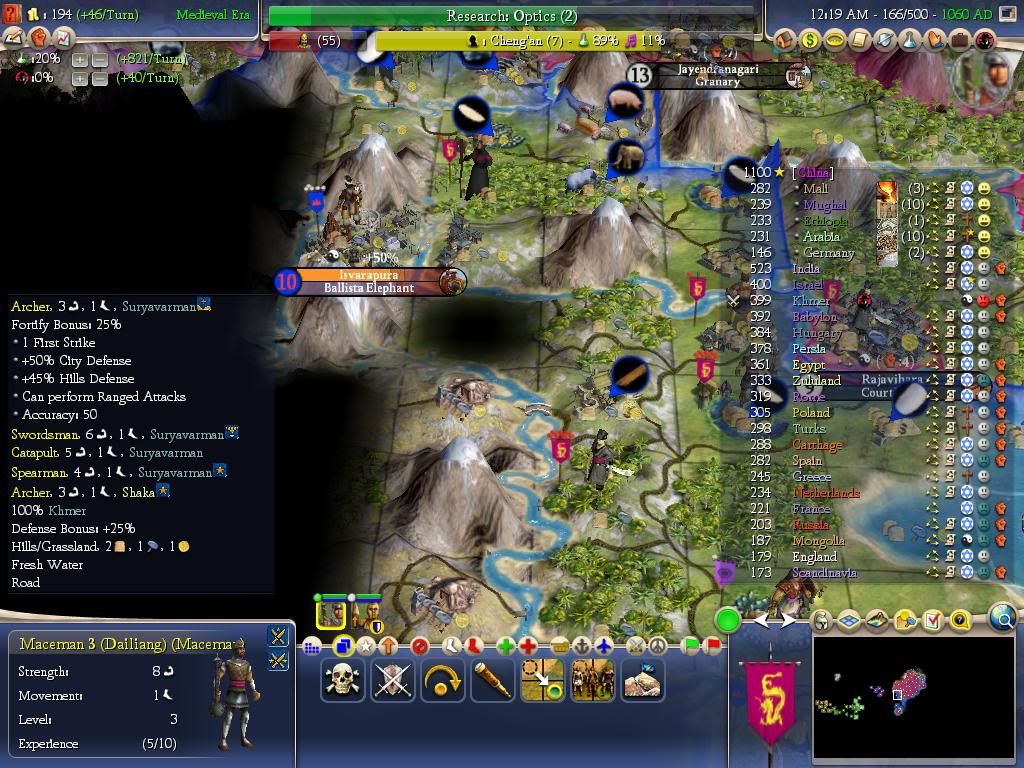
Qin looked at his skin as the water trickled from the falls above. The color that ran along his muscles and his whole body was a nice, uniform bronze. A marked change from the light tone that he sported several months back. It was ideal; no Cambodian would take him for a northern outsider and instead think him to be just some native bronze-skinned Yunnan Han. Appearances meant everything for him, as Qin Zhenlong was a spy under the employ of the Empire. He had stayed incognito for six months in Kampuchea in preparation of this mission. Even though the more recent outrages to the Chinese public were the prime cause for the outbreak of the war; in actuality, preparations for war against Kampuchea had been made since the reign of the previous Xia Emperor.
The man defied regular conventions of how a spy should look and act. With flowing long black hair, a wonderfully structured face and a winsome smile, Qin Zhenlong could easily be mistaken for some Xin Caste companion to a northeastern female Corean bureaucrat. He was Xin Caste in fact. Before he was selected for secret service, many intelligence officials vehemently protested against the Emperor’s selection. By the book, a good spy would need to be inconspicuous and ordinary-looking. Qin wasn’t exactly the kind of man someone could look at and just forget right away. But he was chosen anyway specifically for his unique talents in seduction & blackmail.
He was still bathing in the stream when he heard his companion call for him.
The spy promptly cleaned himself up and waded out of the small lake to see what all the fuss was about.
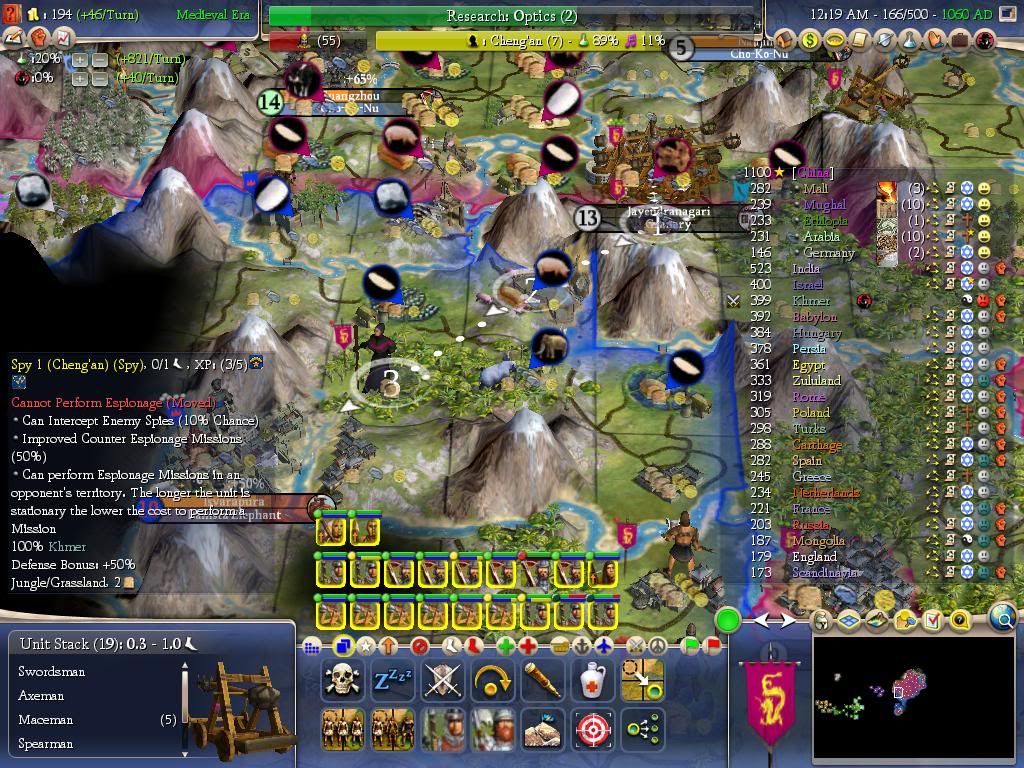
“You called?” Qin asked casually as he approached the campsite.
“Yes, I did, come over here, I need you to-“ Suriya froze as she turned around to see the spy standing there, not having bothered to dress.
“Don’t you have any shame?” she asked incredulously as she eyed Qin with a look of aghast.
“People in Kampuchea walk around without upper body wear, don’t they?”
“Yes, they do, but-“ the female spy was cut off.
“Then I don’t see what the problem is,” Qin shrugged.
“Even so, they don’t go around without bottoms! There is such a thing called modesty,”
She promptly tore off a giant leaf from a nearby tropical plant and handed it to him while turning her head away.
Her companion’s physique was refreshing to look at but self-restraint was the order of the day.
“You didn’t even bother to check for caterpillars,” Qin groaned as he shook off several soft,
green caterpillars from the giant leaf before he tied it to his waist.
Suriya just laughed as she watched him stand there and give her a stern gaze.
“Alright, in all seriousness now, how many days away is Isvarapura?”
“We’ll be able to reach to city on foot in about four days,” Suriya postulated. She paused for one second.
“Provided we don’t run into the Kampuchean patrols on the way of course,” she added.
“And the Thai resistance will be there to welcome us?” he asked.
“Yes; one thing I want to go over though is the nature of our next mission,”
“What would be so pressing about that?” Qin asked as he shook off a stray caterpillar from his abdomen.
“We’re to directly assist the Thai uprising in an armed rebellion within the city, giving your people the distraction they need to go into town undettered,”
Suriya flipped some of her hair behind her left shoulder.
“In all seriousness, I don’t really take you for the fighting type,” she winked.
“It’s not too late to bail out and return to the Empire if you want to just leave it to us,”
“No, I’m going to stay. I think you judge me too poorly,” Qin asserted.
“Good. Let’s see if you can change my mind. Now you just have to get dressed and we’ll move out,” she smiled as she tossed him a proper robe.
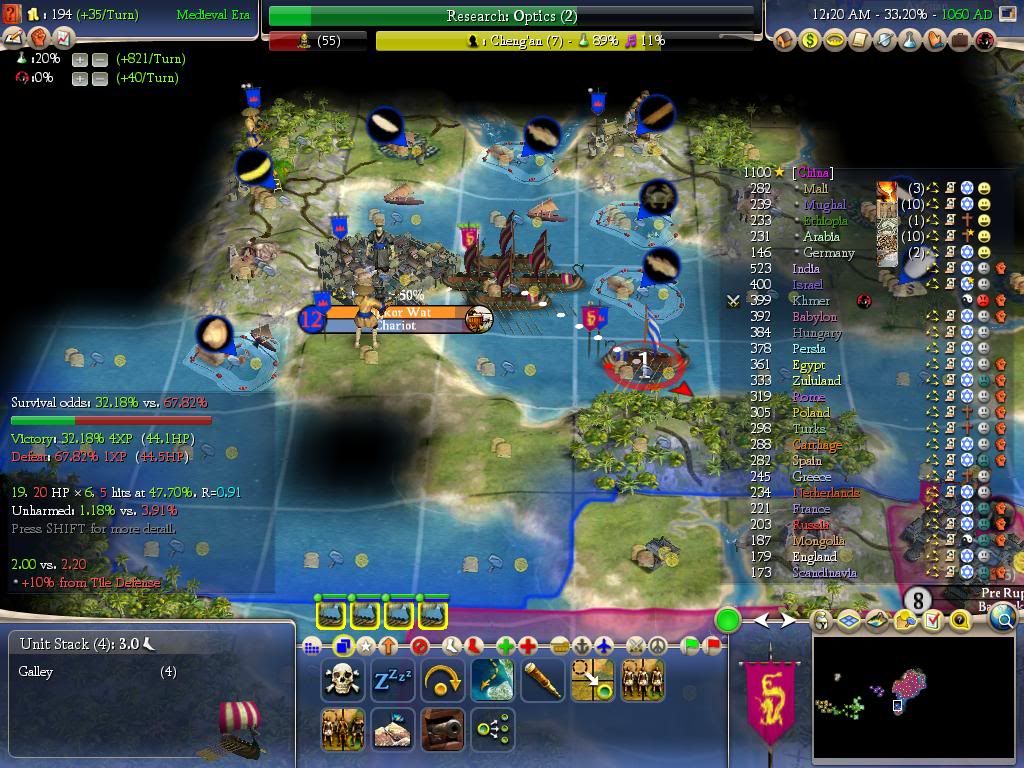
After the Tortoise Armada sunk the Rajavihara treasure fleet, the Kampuchean Navy was out for blood. Action continued in the Gulf of Siam as the Tortoise Armada attempted to flee back into the safe harbor of Chinese-held Pre Rup. The Tortoise Armada prevailed, albeit with moderate damage sustained on several galleys. No ship going inbound to Cambodia proper could pass without being threatened by the Tortoise Armada now. Supply lines from the Kampuchean Phillipines halted and caused massive inflation in the Kampuchean economy as food became scarce, owing as well to the recent algal blooms that exploded throughout the Mekong in the aftermath of the Second Battle of Rajavihara.
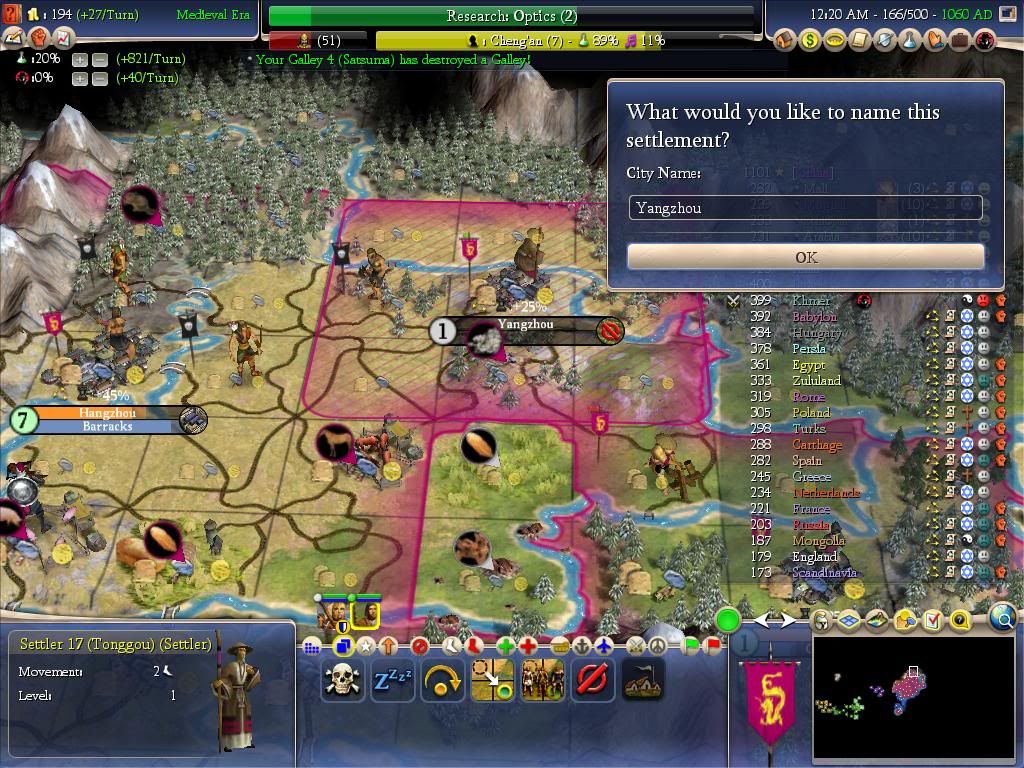
In Africa & Europe, hearsay about a massive war raging far to the Far East was the talk of well-connected individuals of the court. These rumors weren’t restricted to those regions, however. The Manchu remnants had heard the rumors that the Imperial Army was tied up in the South and decided to test their luck. On the eve of the Second Battle of Rajavihara, massive Manchu banner men armies swept in through the barbarian north, threatening to overrun and reclaim the Manchu homelands. Settler communities like the new commandery of Yangzhou faced constant siege by the avaricious Manchus. The desperate situation of the Imperial detachments stationed there was furthered when Louyang decreed that there would be no reinforcements available to send to the north in the wake of increased Kampuchean ferocity. The brave settlers & Imperial detachments would have to hold out for now.
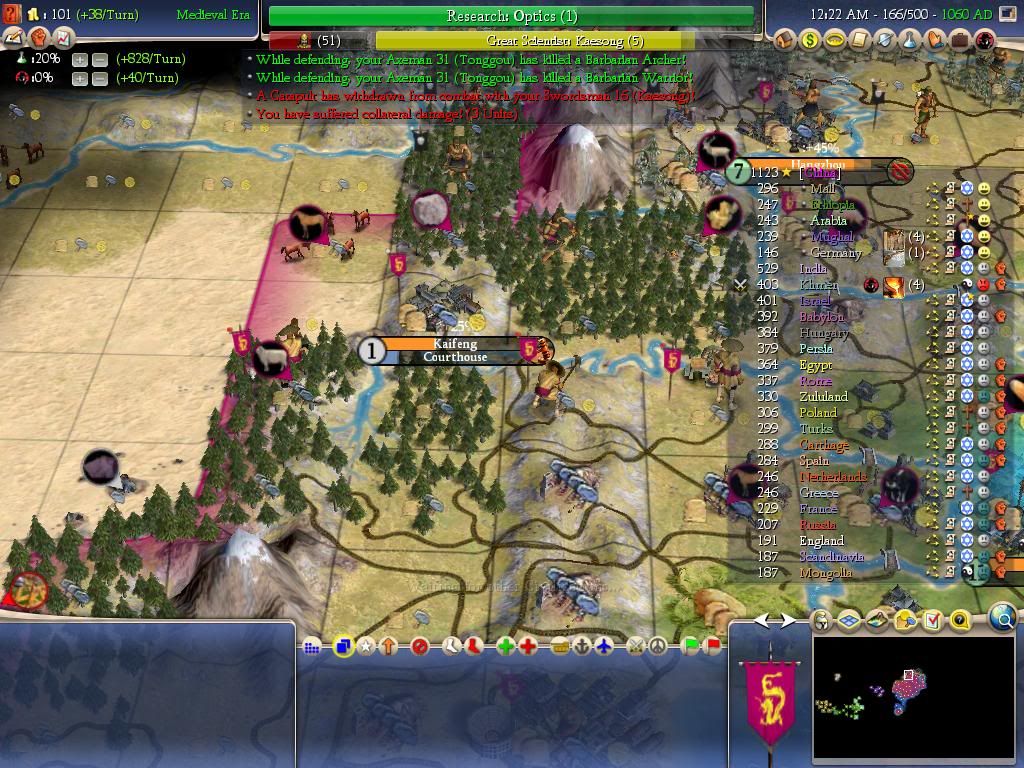
hoplitejoe
Top fun-poster
- Joined
- Mar 22, 2010
- Messages
- 5,470
your empire= 

Tomorrow's Dawn
Heroes Never Die
your killing me by not posting that savegame, but i'll manage
and are you not exploring for the story or are you to busy
I never emphasize exploration unless I'm playing RFC or Earth18/34 (oops) and even then it's just a race to get huts and maybe a few tech trading partners.
Sure I could have built one Scout and explored the vast expanse of the Giant Earth Map, but my foremost priority (as a player) was and always will be the termination of my immediate neighbors. I will reiterate again that the campaign is already finished so this story is pretty much an AAR (After Action Report). What that means is that I can't reverse the fact that I haven't explored. Right now in the story, the photos that have been uploaded are in the #500-600 range. And I revealed the map in photo #812.
Yeah.
The good news is that I revealed the map while still fighting the Cambodians.
Spoiler :
1210 AD. And remember that this is on Normal speed.
So it won't be terribly long from now, I just need you to bear with me and continue to enjoy reading the story.
Yoshiegg737
Jungo Jungo
No problem 

Tomorrow's Dawn
Heroes Never Die
A well-dressed man stared out from his hillside pagoda overlooking the city of Huiji onto the main street. There was one very visible, marked change about the city. The new Xi Ting Chapel was just finished in the Arab Quarter after the Arab community had pooled their funds in order to build the magnificent house of worship. Xi Ting Chapel not only attracted Christians from all across the Empire but had captured the attention of many secular Han admirers as well.
“Do you think they are behind that?”
he asked as his hawkish gaze pierced through the curtained window out into the bustling streets towards the towering church.
“If they were, I would not worry,” another man said in a nonchalant tone.
“You know as well as I do that they cannot take action or use the powers of suggestion where the appropriate protections are in place,”
he took a sip of his tea after eating some of the bean curd in his bowl of rice.
“It still worries me,” the man by the window said, stroking his mustache.
Eventually, he stopped gazing out the window and began pacing about in the suite.
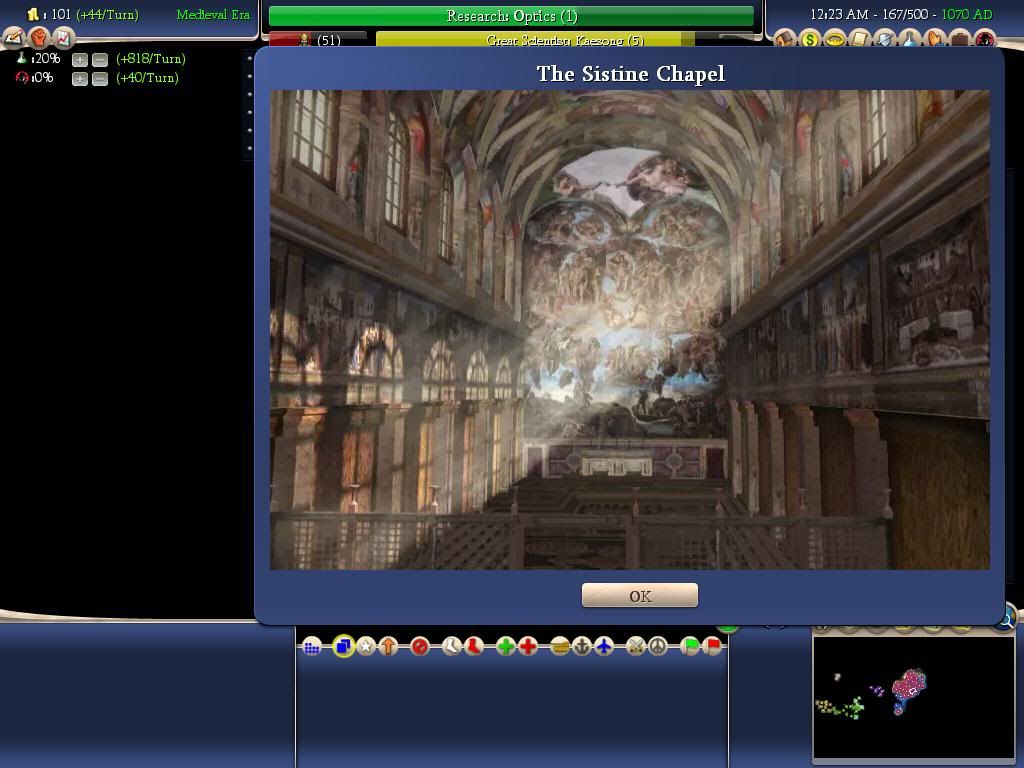
Manchu raiding activity remained at an all-time high as fighting across the border continued. If ten Manchus fell in battle to slay one Han or Corean, it would still be a favorable situation for the Manchus. The situation was so dire in Yangzhou & Hangzhou that even the lame, elderly & infirm were brought out to do battle with the barbarians. The situation had remained largely unchanged until the Testimony of Wang Jiulin came to the fore. She was a seventeen year old settler who had been abducted by Manchu raiders two years prior. The militia and Imperial Army detachments were too stretched thin to send out any rescue parties in the first place and were forced to assume her dead, like many of the other settlers that went missing during the Manchu raids. The girl appeared at the gates of Hangzhou recently, apparently having escaped from her captors. She testified that the Manchus had organized dozens of rape camps & POW mining operations in Siberia, in order to provide a constant stream of soldiers & arms in their campaign against civilization. Savagery and sadism were rife in New Manchuria. The Altaic and Eastern Varangian peoples that previously inhabited the region were the first to fall victim to the Manchu depravity and the Han & Corean abductees like herself were used for the same purpose. Many of the girls in the camps were not even of child rearing age and many died from the constant psychological anguish, abuse and horrid conditions of their surroundings. Jiulin showed the scars she had sustained during her captivity and broke into tears when she admitted that she had given birth through her captors.
The national outrage was tremendous, but the Kampucheans were still the bigger threat. Xia Pei was able to make a few concessions to the public though. The Xia Emperor and the court reversed the decision to delay reinforcements to Manchuria and rerouted regiments raised in Chaoxian to go north instead of joining the Southern Pacification Army.
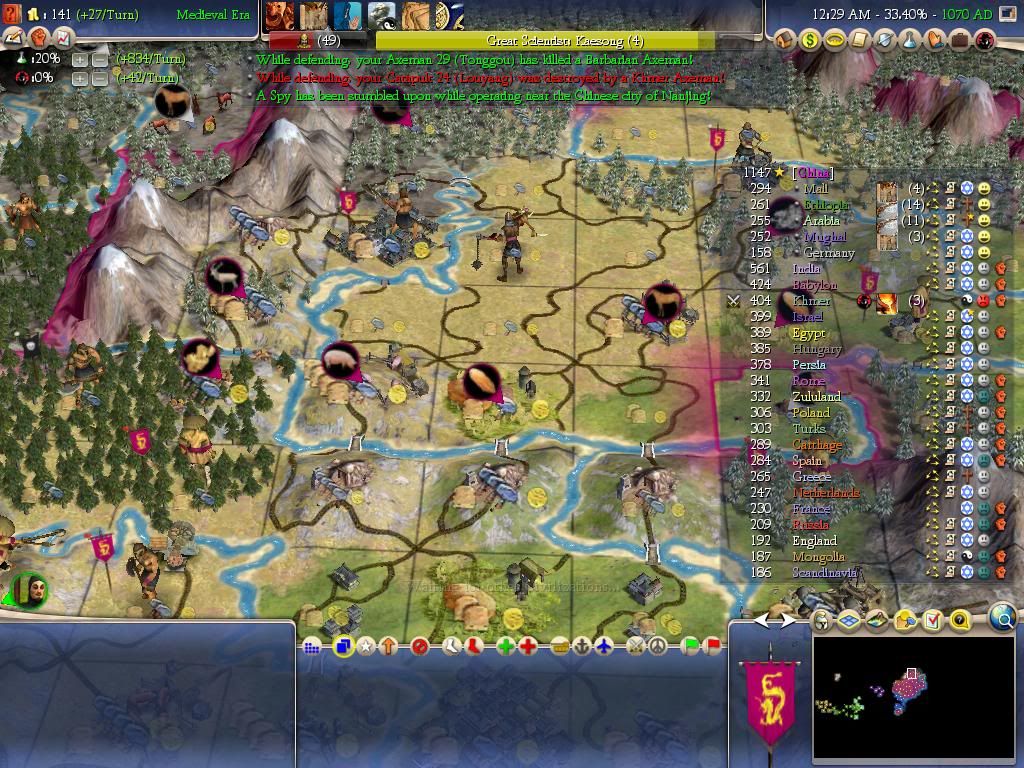
The ambassador of the Tartar Khan, requested an audience with Xia Pei, Emperor of the Chinese, with a plea for assistance in their war against the Littorn Commonwealth to which he was firmly rebuffed. Whispers in the court affirmed fears about a possible Tartar backlash against the Han for not assisting them in their time of need but Xia Pei stood firm. The Empire was already fighting a two-front war and could not afford a third despite all its power. Still, the Tartars would never dream of making an attack on Han territories in the midst of this crisis. The fearsome Louyang Imperial Guard was at the ready at all times, watching the border for Tartar raiders.
In secret, Pashtun officials from the Pakixitan Special Administrative Zone had informed the Emperor that a massive Littorn army was requesting passage through Pakixitan on their march against the Khanate. Although relations were still cordial, the Littorn army had suggested the possibility of rerouting their target should they not be allowed to pass. As the Emperor was sensitive to the needs of his far-flung territories, he acceded to their request and allowed the Littorn army passage through his own hinterland as well. In short, he had already sealed the fate of the Khanate and sold them to the Commonwealth.

“They detected another legacy site in Kamchatka,”
“Another one? I presume the Ru- excuse me, Varangians built them to last, didn’t they?”
“Yes, they did,” by this time, the seated man had finished eating. “I ordered the expedition to take the overland route,”
“But that’s through Manchu-held territory though!” the mustached man gaped, astonished.
“I know,” came his companion’s reply. “The task force is well-prepared for that,”
“I’ll trust in you then. Is there anything else of note I should know about?”
“Preparations are already underway in Osaka for the overseas expedition,”
the calm & collected man said as he took one last sip of his tea.
He finally gave his companion eye contact as he set his cup down.
“We’ll finally be able to gain confirmation if anything remains over there or not,”
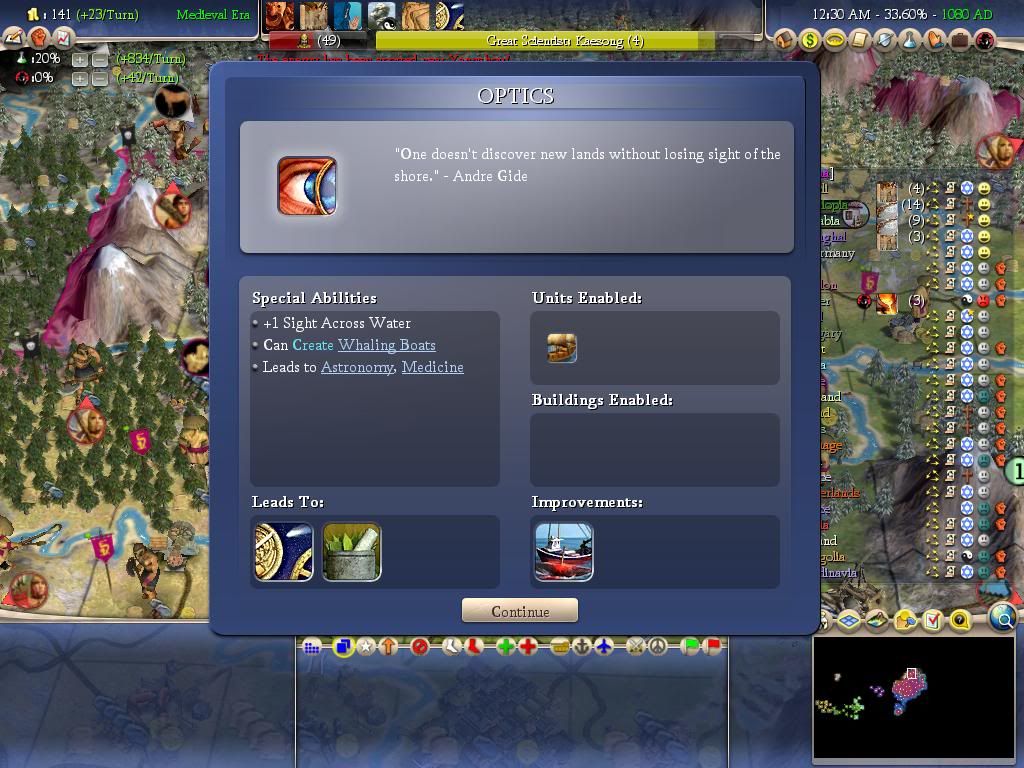
“Do you think they are behind that?”
he asked as his hawkish gaze pierced through the curtained window out into the bustling streets towards the towering church.
“If they were, I would not worry,” another man said in a nonchalant tone.
“You know as well as I do that they cannot take action or use the powers of suggestion where the appropriate protections are in place,”
he took a sip of his tea after eating some of the bean curd in his bowl of rice.
“It still worries me,” the man by the window said, stroking his mustache.
Eventually, he stopped gazing out the window and began pacing about in the suite.

Manchu raiding activity remained at an all-time high as fighting across the border continued. If ten Manchus fell in battle to slay one Han or Corean, it would still be a favorable situation for the Manchus. The situation was so dire in Yangzhou & Hangzhou that even the lame, elderly & infirm were brought out to do battle with the barbarians. The situation had remained largely unchanged until the Testimony of Wang Jiulin came to the fore. She was a seventeen year old settler who had been abducted by Manchu raiders two years prior. The militia and Imperial Army detachments were too stretched thin to send out any rescue parties in the first place and were forced to assume her dead, like many of the other settlers that went missing during the Manchu raids. The girl appeared at the gates of Hangzhou recently, apparently having escaped from her captors. She testified that the Manchus had organized dozens of rape camps & POW mining operations in Siberia, in order to provide a constant stream of soldiers & arms in their campaign against civilization. Savagery and sadism were rife in New Manchuria. The Altaic and Eastern Varangian peoples that previously inhabited the region were the first to fall victim to the Manchu depravity and the Han & Corean abductees like herself were used for the same purpose. Many of the girls in the camps were not even of child rearing age and many died from the constant psychological anguish, abuse and horrid conditions of their surroundings. Jiulin showed the scars she had sustained during her captivity and broke into tears when she admitted that she had given birth through her captors.
The national outrage was tremendous, but the Kampucheans were still the bigger threat. Xia Pei was able to make a few concessions to the public though. The Xia Emperor and the court reversed the decision to delay reinforcements to Manchuria and rerouted regiments raised in Chaoxian to go north instead of joining the Southern Pacification Army.

The ambassador of the Tartar Khan, requested an audience with Xia Pei, Emperor of the Chinese, with a plea for assistance in their war against the Littorn Commonwealth to which he was firmly rebuffed. Whispers in the court affirmed fears about a possible Tartar backlash against the Han for not assisting them in their time of need but Xia Pei stood firm. The Empire was already fighting a two-front war and could not afford a third despite all its power. Still, the Tartars would never dream of making an attack on Han territories in the midst of this crisis. The fearsome Louyang Imperial Guard was at the ready at all times, watching the border for Tartar raiders.
In secret, Pashtun officials from the Pakixitan Special Administrative Zone had informed the Emperor that a massive Littorn army was requesting passage through Pakixitan on their march against the Khanate. Although relations were still cordial, the Littorn army had suggested the possibility of rerouting their target should they not be allowed to pass. As the Emperor was sensitive to the needs of his far-flung territories, he acceded to their request and allowed the Littorn army passage through his own hinterland as well. In short, he had already sealed the fate of the Khanate and sold them to the Commonwealth.

“They detected another legacy site in Kamchatka,”
“Another one? I presume the Ru- excuse me, Varangians built them to last, didn’t they?”
“Yes, they did,” by this time, the seated man had finished eating. “I ordered the expedition to take the overland route,”
“But that’s through Manchu-held territory though!” the mustached man gaped, astonished.
“I know,” came his companion’s reply. “The task force is well-prepared for that,”
“I’ll trust in you then. Is there anything else of note I should know about?”
“Preparations are already underway in Osaka for the overseas expedition,”
the calm & collected man said as he took one last sip of his tea.
He finally gave his companion eye contact as he set his cup down.
“We’ll finally be able to gain confirmation if anything remains over there or not,”

hoplitejoe
Top fun-poster
- Joined
- Mar 22, 2010
- Messages
- 5,470
To America!
Duke of Britain
Emperor
- Joined
- Jul 15, 2009
- Messages
- 1,600
America? i only know 美! 
and lol, did you ever got any civil war?

and lol, did you ever got any civil war?
Tomorrow's Dawn
Heroes Never Die
America? i only know 美!
and lol, did you ever got any civil war?
You've only ever known beauty? Well, it's going to get a whole lot more ugly from here.
Anyways, it says Revolutions are enabled in one of my opening screenshots but they're actually not.
In order words, there are no separatists or breakaway states.
I'm only playing with Inquisitors, Super Spies & Opportunity Fire.
Duke of Britain
Emperor
- Joined
- Jul 15, 2009
- Messages
- 1,600
You've only ever known beauty? Well, it's going to get a whole lot more ugly from here.
Anyways, it says Revolutions are enabled in one of my opening screenshots but they're actually not.
In order words, there are no separatists or breakaway states.
I'm only playing with Inquisitors, Super Spies & Opportunity Fire.
It's not my fault, i used the google translator...
but this is sad, revolutions is one of the best features in any mod.
Yoshiegg737
Jungo Jungo
Advanced Diplomacy is the best feature in any mod
Just saying
Just saying

Dhoomstriker
Girlie Builder
- Joined
- Aug 12, 2006
- Messages
- 13,468
As usual, another excellent update! You have a very effective method at drawing out a reader's raw emotions using words. It is very easy to get immersed in the story and feel what the characters or people in the story are feeling, whether it be great sadness, other emotions, or like in the latest update, great moral outrage.
Well, you were very close and got the first half of it! America = 美国, which literally translates to "beautiful country."America? i only know 美!
Civ'ed
I ain't gotta explain a thing
No spam people. Please. For the sake of the forum.
Tomorrow's Dawn
Heroes Never Die
The battle-lines were drawn after the Southern Pacification Army crossed the Red River Delta into Nam Dinh. Another massive Kampuchean army stood at the fore, intent on drawing out the Chinese into open combat once more. As they advanced slowly, it seemed as if they were actually giving the Chinese time to set up their formations.
As if it didnt matter.
They were no ordinary soldiers. The men that stood at the front of the ranks were the ethnic Kinh loyalists of Kampuchea.
Each soldier carried a gươm; large anti-cavalry sabers at least twice as long as a Chinese jian.
From information disseminated by advance scouts, it was said that one of those blades could slice a man a two with ease.
The appearance of anything other than the Cambodian rank-and-file visibly made the front-line nervous.
No one had ever fought soldiers like that before.
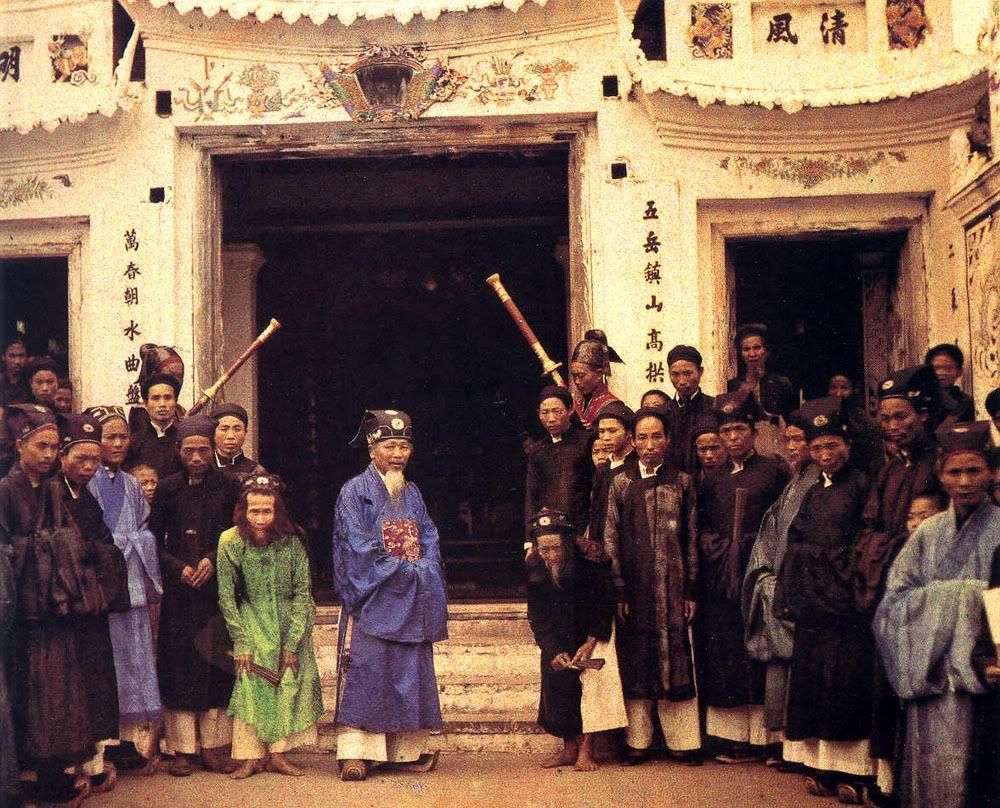
Mohammed heard it. He heard the ground rumble. The Kampuchean heavy cavalry arrived. Thousands of great, lurching beasts stood at attention behind the first line of Dai Viet infantry. With a collective war-cry that sent shivers down the spines of the nervous Chinese defenders, the Kampucheans broke out into a full assault.
The first line of defense, made up of axe-soldiers crumbled within minutes of first contact as the Kampucheans charged in at full force.
The line broke as the first wave of the enemies hurdled over the bodies of our first line of defenders.
Dai Viet gươm troopers charged onwards as the ballista elephants covered their entry with their projectile assault.
Our artillery was able to snipe away some of the beasts but it was no good; there were simply too many of them.
Everyone could see from the troop movements that we attempted to deploy flanking troops to encircle the charging enemy, forces but it didnt work.
As flanking soldiers attempted to close in from the sides, the elephant riders simply rotated their ballistas to face their flanks and shredded them to pieces.
The confidence that Mohammed had slowly gained throughout the course of the war became non-existent almost instantaneously. As the elephants approached and fired on his position, he could barely suppress a yelp as he witnessed a helpless Dragon Marauder fly into the air as an elephants trunk took hold of him and proceeded to impale him in midair on the point of a tusk.
We all ran. There was no discipline left. Only fear. Captain Yue ordered a calm, orderly retreat as did many other of the unit captains but we all knew those werent official orders. Our sense of self-preservation had overridden everything else. Only the elite Louyang contingents stood their ground and clashed with the Dai Viet infantry, supported by the field artillery, who began to mass fire on the largest concentrations of elephant cavalry.
I dont know what happened to them afterwards. I never looked back.
It was pure chaos. Morale had been completely lost at the sight of such hulking monstrosities.
Along with three other units, Mohammed and the rest of his unit fled several thousand meters up into the hills away from the battle and holed up by the heavily jungled ridge, watching for any sign of enemy movement. Fortunately, one of the escaped units was a baggage troop and began to disperse bow weaponry in anticipation of a Kampuchean pursuit. Every man took for himself a Cho-Ko-Nu crossbow and hastened to fortify the ridge. The elephants did not pursue.
Even when nightfall came, they did not stop watching for them.
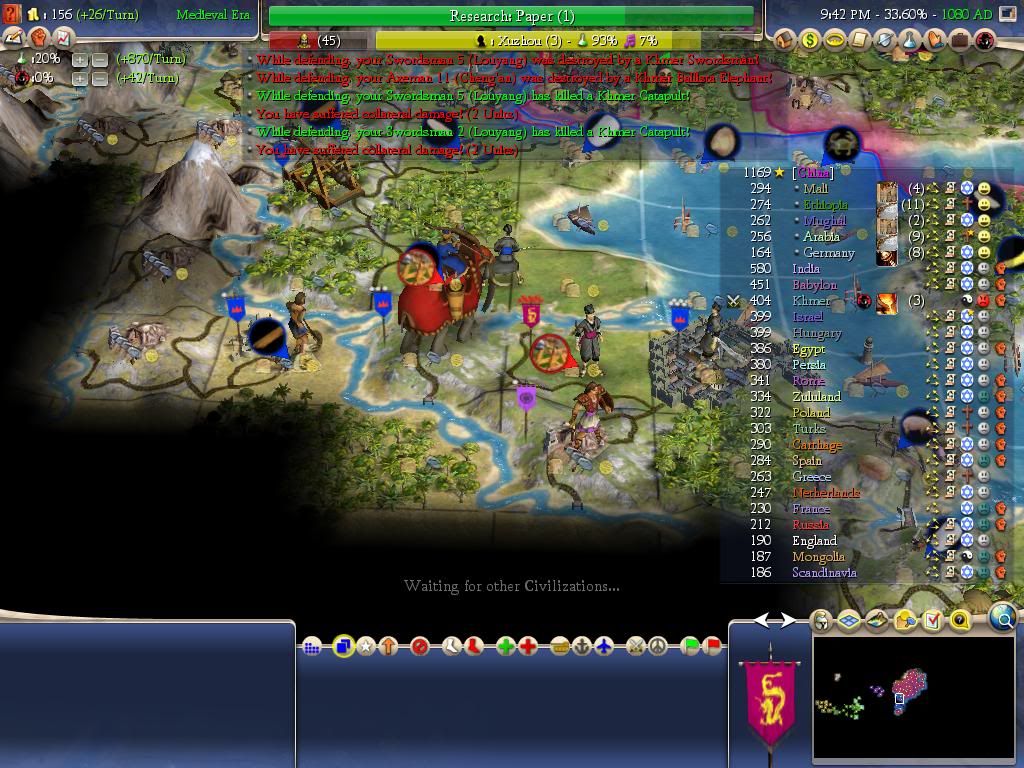
Naval engagements continued in the Gulf of Siam as now, the Tortoise Armada not only blockaded Kampuchean shipping lanes, but actively harassed their fishing operations as well. A new fleet was rushed out of harbor to strike against the Tortoise Armada but was as quickly sunk as it had been made. The swift victory was due in part to the lack of experience the drafted sailors had in naval warfare compared to the nautical know-how and experience of the men who helmed the Chinese fleet. Now that both overseas commodities and Gulf fishing had come to a complete stop, full on riots erupted across the southern ends of the Kampuchean Empire. Inflation was at an all-time high and many peasants and lower class urban-dwellers took to the streets and began to raid the granaries in order to feed their families. Martial law was decreed in at least four cities as soldiers marched in to suppress the riots.
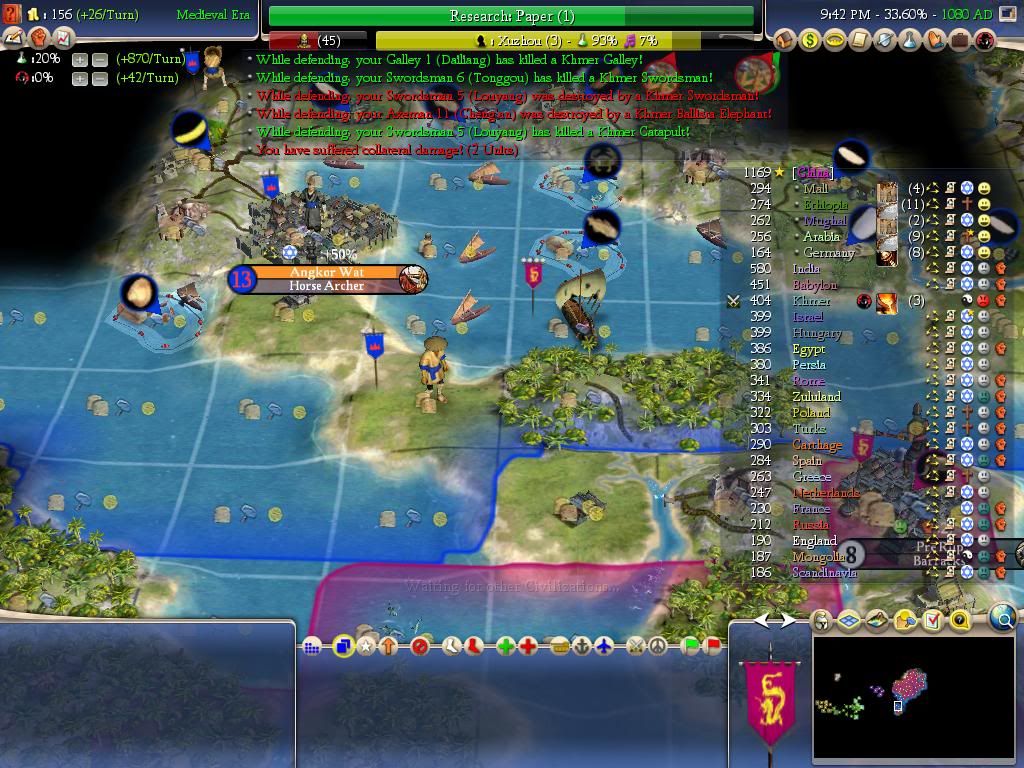
The first wave of Imperial reinforcements to Manchuria had finally arrived after several days of arduous travel. Welcomed with open, but tired arms, they mingled with the locals and helped to ease the burden of the exhausted frontiersmen and their families. To the surprise of the soldiers though, they found that rule of law had become practically non-existent here. Over the years, the settlers who lived on the frontier had developed their own microcosm of laws through exposure to the very different conditions that they faced on the edge of civilization. Most notably, the worst capital offense was the theft of an individuals horse; in the past year, thirty seven able-bodied men and four-hundred and twelve Manchu POWs were executed by local governance for that crime alone. In the eyes of a settler, if a family living on the frontier was deprived of their one link back to town, they were as good as dead. Their fates would be left to the cruelties of winter or the depredations of the Manchu soldiers who stalked every corner of every wood.
The threats posed by living in the frontier had given birth a new militant, rough-around-the-edges, close-knit culture that branched off from the Han culture that it was borne from. The frontier culture.
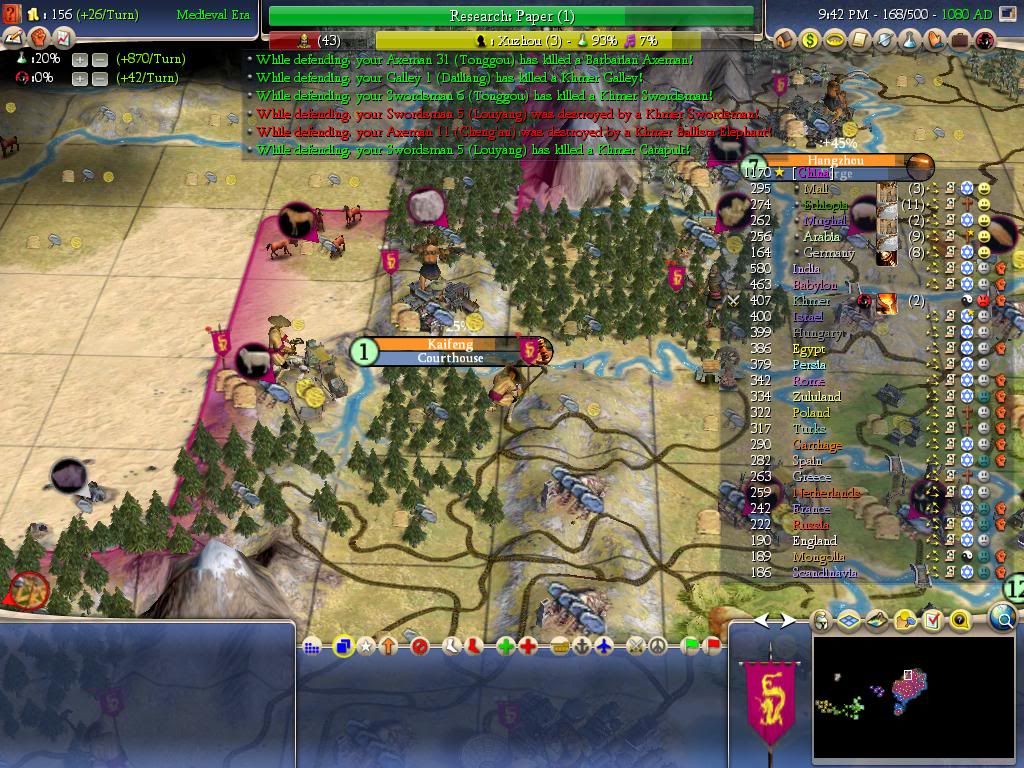
As if it didnt matter.
They were no ordinary soldiers. The men that stood at the front of the ranks were the ethnic Kinh loyalists of Kampuchea.
Each soldier carried a gươm; large anti-cavalry sabers at least twice as long as a Chinese jian.
From information disseminated by advance scouts, it was said that one of those blades could slice a man a two with ease.
The appearance of anything other than the Cambodian rank-and-file visibly made the front-line nervous.
No one had ever fought soldiers like that before.

Mohammed heard it. He heard the ground rumble. The Kampuchean heavy cavalry arrived. Thousands of great, lurching beasts stood at attention behind the first line of Dai Viet infantry. With a collective war-cry that sent shivers down the spines of the nervous Chinese defenders, the Kampucheans broke out into a full assault.
The first line of defense, made up of axe-soldiers crumbled within minutes of first contact as the Kampucheans charged in at full force.
The line broke as the first wave of the enemies hurdled over the bodies of our first line of defenders.
Dai Viet gươm troopers charged onwards as the ballista elephants covered their entry with their projectile assault.
Our artillery was able to snipe away some of the beasts but it was no good; there were simply too many of them.
Everyone could see from the troop movements that we attempted to deploy flanking troops to encircle the charging enemy, forces but it didnt work.
As flanking soldiers attempted to close in from the sides, the elephant riders simply rotated their ballistas to face their flanks and shredded them to pieces.
The confidence that Mohammed had slowly gained throughout the course of the war became non-existent almost instantaneously. As the elephants approached and fired on his position, he could barely suppress a yelp as he witnessed a helpless Dragon Marauder fly into the air as an elephants trunk took hold of him and proceeded to impale him in midair on the point of a tusk.
We all ran. There was no discipline left. Only fear. Captain Yue ordered a calm, orderly retreat as did many other of the unit captains but we all knew those werent official orders. Our sense of self-preservation had overridden everything else. Only the elite Louyang contingents stood their ground and clashed with the Dai Viet infantry, supported by the field artillery, who began to mass fire on the largest concentrations of elephant cavalry.
I dont know what happened to them afterwards. I never looked back.
It was pure chaos. Morale had been completely lost at the sight of such hulking monstrosities.
Along with three other units, Mohammed and the rest of his unit fled several thousand meters up into the hills away from the battle and holed up by the heavily jungled ridge, watching for any sign of enemy movement. Fortunately, one of the escaped units was a baggage troop and began to disperse bow weaponry in anticipation of a Kampuchean pursuit. Every man took for himself a Cho-Ko-Nu crossbow and hastened to fortify the ridge. The elephants did not pursue.
Even when nightfall came, they did not stop watching for them.

Naval engagements continued in the Gulf of Siam as now, the Tortoise Armada not only blockaded Kampuchean shipping lanes, but actively harassed their fishing operations as well. A new fleet was rushed out of harbor to strike against the Tortoise Armada but was as quickly sunk as it had been made. The swift victory was due in part to the lack of experience the drafted sailors had in naval warfare compared to the nautical know-how and experience of the men who helmed the Chinese fleet. Now that both overseas commodities and Gulf fishing had come to a complete stop, full on riots erupted across the southern ends of the Kampuchean Empire. Inflation was at an all-time high and many peasants and lower class urban-dwellers took to the streets and began to raid the granaries in order to feed their families. Martial law was decreed in at least four cities as soldiers marched in to suppress the riots.

The first wave of Imperial reinforcements to Manchuria had finally arrived after several days of arduous travel. Welcomed with open, but tired arms, they mingled with the locals and helped to ease the burden of the exhausted frontiersmen and their families. To the surprise of the soldiers though, they found that rule of law had become practically non-existent here. Over the years, the settlers who lived on the frontier had developed their own microcosm of laws through exposure to the very different conditions that they faced on the edge of civilization. Most notably, the worst capital offense was the theft of an individuals horse; in the past year, thirty seven able-bodied men and four-hundred and twelve Manchu POWs were executed by local governance for that crime alone. In the eyes of a settler, if a family living on the frontier was deprived of their one link back to town, they were as good as dead. Their fates would be left to the cruelties of winter or the depredations of the Manchu soldiers who stalked every corner of every wood.
The threats posed by living in the frontier had given birth a new militant, rough-around-the-edges, close-knit culture that branched off from the Han culture that it was borne from. The frontier culture.

hoplitejoe
Top fun-poster
- Joined
- Mar 22, 2010
- Messages
- 5,470
Now to America?
Mosher
Mushroom dad
'Mericuh!
Similar threads
- Replies
- 12
- Views
- 3K
- Replies
- 73
- Views
- 6K
- Replies
- 5
- Views
- 3K

